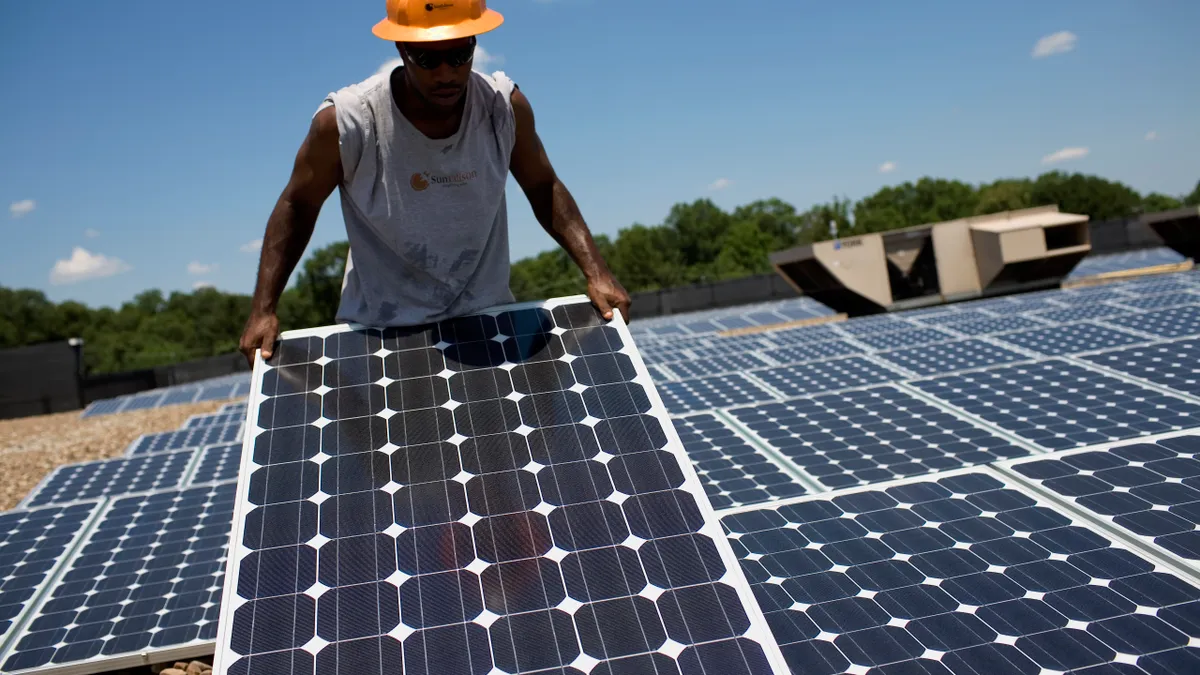Solar policy is high drama all across the nation, but if a recent round of major hires is any indicator, the rooftop sector is looking for a new regulatory approach.
When SolarCity, the largest rooftop developer in the U.S., tapped former FERC chairman Jon Wellinghoff to head its policy efforts, company officials said they wanted to foster a more collaborative, less combative approach with regulators and the utility sector.
Now it appears Sunrun, known for aggressive lobbying efforts, is attempting to send the same message after parting ways with Bryan Miller, its controversial policy head and the former spokesperson for The Alliance for Solar Choice (TASC).
In his place comes Anne Hoskins, a former Maryland regulator who’s worn many hats in the power sector, including working for utilities.
“Obviously I was open to opportunities to see what I could do next in my career and this opportunity came up,” Hoskins told Utility Dive. “It's such a perfect fit for my interests and a place where I could make an impact and advance clean energy.”
Sunrun has been involved in a number of heated state policy debates, often participating through its membership in TASC.
Notable examples include the recent Nevada net metering debate, which cut retail remuneration rates for rooftop solar customers, increased fixed charges and omitted a grandfathering clause for roughly 30,000 existing rooftop solar customers. In a reversal, regulators later approved a grandfathering settlement struck between incumbent utility NV Energy and solar advocates.
But Sunrun’s abrasive reputation through TASC could be a roadblock to persuading some to collaborate. Even Hoskins acknowledged her new company’s recent reputation, but said she plans to continue to carry on the legacy of “empowering solar customers” through advocacy.
"I think having served both as an advocate in the past, in the telecoms and energy sector and then as a former commissioner, I have a very good understanding how the process works,” Hoskins said. “I [hope I] can be effective for our team to continue to make the case for why it's so important to have opportunities for customers to generate their own energy.”
A change in attitude
From Arizona to and Maine, rooftop solar debates follow a common theme. Utilities argue rooftop solar customers don’t pay their fair share for grid upkeep, while solar advocates say utilities — and regulators — often don’t quantify the full benefits of solar into their decisions.
That's something Hoskins wants to change.
“That's really what this is all about; [it’s] ensuring that the regulations and the policies are in place that allow competition that allows customers to self generate and allow us to find cleaner solutions going forward.”
Sunrun, through its membership of TASC, was usually the most vocal of these. Shortly after the controversial Nevada net metering decision at the end of last year, several solar stakeholders told Utility Dive that TASC’s sharp rhetoric during the debates alienated regulators.
Sunrun and SolarCity left the state after the final decision, but both remained active in the Nevada regulatory proceedings. In April of this year, SolarCity hired Wellinghoff, who planned to work with utilities instead of against them, provided they also stepped up to the table.
“I would also make it clear that if a collaborative approach does not appear to be possible, I would also encourage [SolarCity] and hopefully assist the company to participate in an adversarial process,” Wellinghoff told Utility Dive. “[And] we should do that in a transparent manner ... that would move our agenda forward."
In July, Sunrun and Miller parted ways. Miller's departure and a subsequent deal with Exelon subsidiary Constellation to offer a solar option to retail customers in Massachusetts, Maryland, New Jersey and New York appeared to signal that Sunrun was prepared to alter its strategy.
Meanwhile, two states also managed to bring both parties to the table and hash out compromises over rooftop solar compensation. In New York, solar and utility interests settled on a deal — pending regulatory approval — to outline a transition from net metering.
In Colorado, solar interests worked with Xcel Energy on a plan to set time-of-use rates for solar customers instead of a proposed fixed fee. Sunrun was involved in Colorado’s proceedings and Hoskins said the process illustrated her point about collaboration.
“I personally think there's an opportunity for parties in all the states to work collaboratively, but it takes all parties to come to the table.”
Hoskins’ vision
At various times, Hoskins worked as a senior vice president of of the Public Service Enterprise Group (PSEG) under current CEO Ralph Izzo as well as an advocate for the telecoms industry.
During her tenure as regulator, Hoskins oversaw a few high-profile proceedings. These cases include Maryland’s first community solar program and the Hughes v. Talen Energy case, which sought to incentivize new in-state power generation. It was later thrown out by the U.S. Supreme Court.
Hoskins told Utility Dive earlier this year that “one of the things we’ve tried to be very cognizant of in Maryland, because we do have competitive providers, we want to make sure we don’t take actions that preclude economic developments...I do want to see utilities continue and reach out and participate in these activities, but it has to be done in a way to recognize that other players can participate.”
Fair market competition is a particular focal point for Hoksins, who told Utility Dive in an interview before she was hired by Sunrun, that she envisions the utility as an enabling force, not complete owner.
“Only as a last resort should they be allowed to provide these [distributed energy resources] services to customers and if so, they should be allowed to rate base it," she said.
Opening regulatory proceedings to a wider variety of voices is another alternative to fighting through contested proceedings.
“I do think using some stakeholder processes that are not your traditional adversarial rate case mechanisms are probably more productive,” Hoskins said. “In those cases, you can have more participation. It’s very costly to participate in adjudicatory proceedings. There's a lot of complications to really getting voices heard.”
With at least 35 state debates over rooftop solar compensation and fees currently taking place, Hoskins knows she doesn’t face an easy task.
“There are unfortunately a lot of efforts to try to block the development of clean energy. there are many proposals popping up around the country through rate cases or through either proceedings to do things like put fixed charges on customers which are very inconsistent with trying to advance the public interest and advance benefits for customers and enable the growth of clean energy,” Hoskins said.
While preferring a more collaborative route, she will not hesitate to put up a fight if proceedings take the “traditional adversarial” route.
“I expect the utilities will put up a hard case and we will also," she said. "But it will done by the rules.”
Clarification: The post has been updated to reflect that a quote from Hoskins was said in an earlier interview with Utility Dive before she was hired by Sunrun.





















